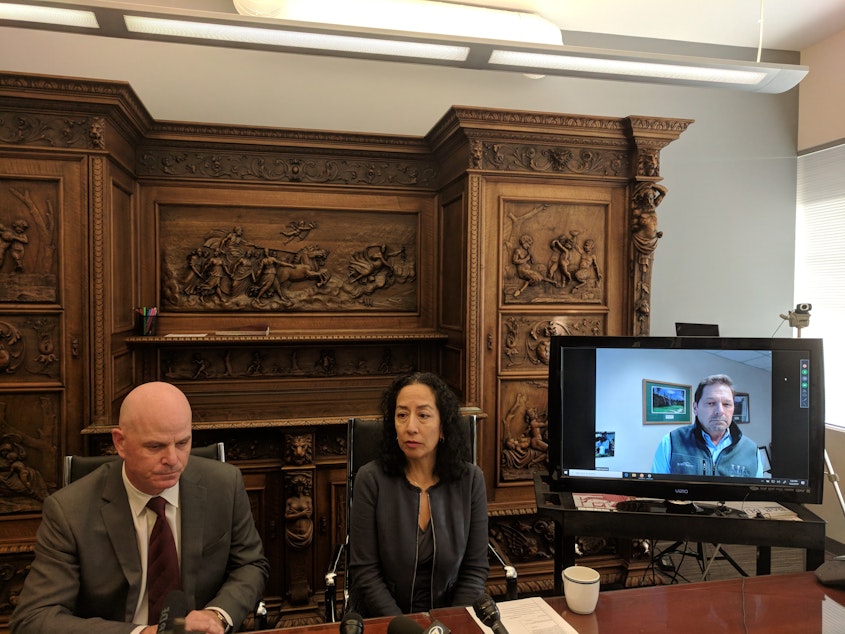Seattle Children’s ‘engaged in a cover-up' after mold infections, lawsuit claims

Seattle Children's hospital is facing lawsuits over mold-related deaths and infections.
One claim filed Monday on behalf of four children is seeking class action status.
The suit claims all four children were infected with Aspergillus mold while they were patients at the hospital. Three have since died.
The complaint alleges hospital management knew for years that issues with the air filtration system could be linked to Aspergillus mold infections, and “engaged in a cover-up designed to reassure its patients, doctors, nurses, and the public that its premises were safe, when in fact they were not.”
The esteemed pediatric institution has had to close operating rooms twice this year due to the mold.
A Seattle Children’s spokesperson said in a statement Monday: “We are incredibly sorry for the hurt experienced by these families and regret that recent developments have caused additional grief.
Sponsored
"Out of respect for privacy, we do not intend to share details about our patients or comment on specific cases or legal action.”
Sponsored
Karen Koehler of law firm Stritmatter Kessler Koehler Moore is one of the attorneys on the class action case.
She said at a press conference that their suit doesn’t target doctors or nurses at the hospital.
“We’re looking at maintenance of premises, and we’re looking at management decisions and what happened here that even the doctors and nurses weren’t aware of,” Koehler said.
She said the hospital failed to maintain a sterile and safe environment for patients, particularly in the operating rooms.
Sponsored
Last month, Children’s CEO Jeff Sperring admitted that mold-related infections go back nearly 20 years.
Between 2001 and 2019, 14 patients were infected at Children’s. Six of them died.
Sperring said they did not make the connection until this year.
"At the time we believed that these were isolated incidents, we now believe that these infections were likely caused by the air handling system that served our operating rooms," he said.
"Looking back, we should have made the connection sooner. Simply put, we failed."
Sponsored
John Layman, one of the attorneys on the class action case, sued the hospital in 2005 on behalf of a patient infected with Aspergillus. In that lawsuit, he alleged that the hospital’s inadequate maintenance of the air-handling system was to blame.
The Seattle Times reports that Children’s vigorously denied and fought the allegations at the time.
The 2005 case was settled three years later in a confidential agreement. But some of the claims from that case are re-hashed in the lawsuit seeking class action status.
It states Children’s “knew or should have known by at least August 2000 that its negligent failure to provide safe premises directly caused the transmission of Aspergillus to its vulnerable child patients.”
The complaint also states that the hospital was aware in the early 2000s, due to internal communications and concerns raised by an engineering consultant, of several issues with the air-filtration system. It lists concerns including the lack of a formal maintenance program and air intake screens being plugged by debris, including dead and live birds.
Sponsored
At a press conference Monday, Layman said he was “appalled and angry” that Children’s is claiming they didn’t make the connection between the mold-related illnesses and the air-filtration system until recently.
Aspergillus is a common mold that lives both indoors and outdoors. According to the Centers for Disease Control and Prevention, most people breathe in spores of the mold every day without getting sick. However, it can cause complications for people with weakened immune systems.
All the cases of infection identified by Children’s were patients who had undergone surgery.
However, attorneys are not limiting the class action suit to surgical patients. They said they believe “dozens if not hundreds” of other children may have been infected.
A separate lawsuit was filed Monday on behalf of an 11-year-old boy. That suit claims he was infected during a non-emergency neurosurgery earlier this year.
Sponsored
Children’s is installing a new air-handling system, including custom air filters in each operating room. According to CEO Sperring, the new filters are the highest level on the market for hospitals.
The hospital closed 10 of its 14 operating rooms last month.




